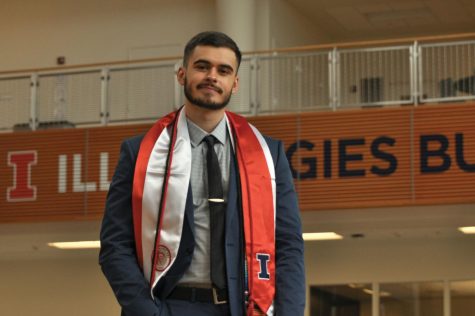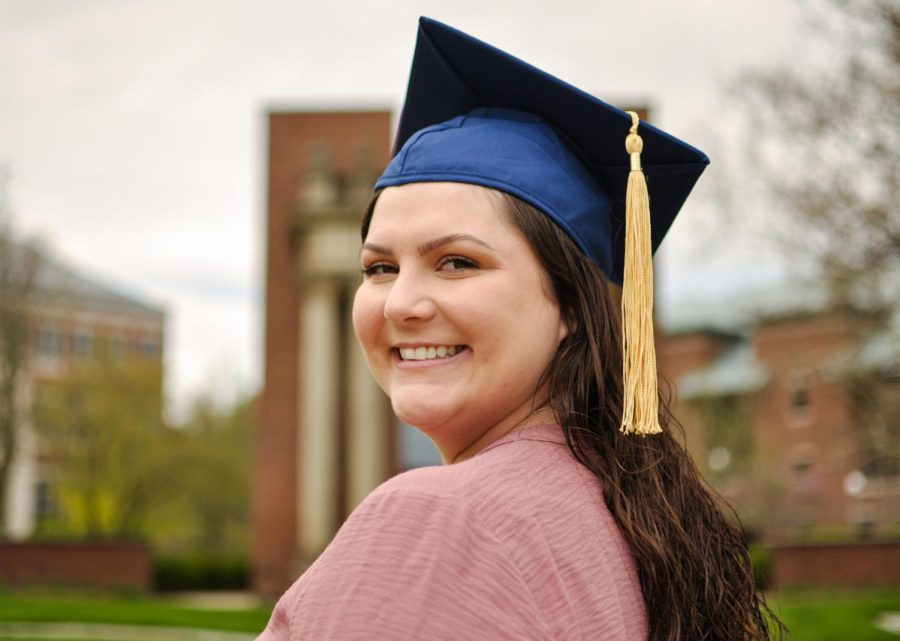First-generation graduates reflect on college journey
Rileigh Kilgore, a graduate student studying social work, grew up in Watseka, Illinois and is the first in her family to go to college. Other students look back and talk about their college experience as a first generation students.
May 4, 2022
When Rileigh Kilgore, a graduate student in Social Work, was about to walk onto the stage to accept her bachelor’s degree a year ago, five family members surrounded her, repeatedly adjusting her gown to ensure all wrinkles were out and her cap was on straight.
Growing up in Watseka, Ill., a small town with a population of less than 6,000, Kilgore was the first in her family to go to college. Despite the COVID-19 protocol at the time, Kilgore remembered the euphoria she felt when her whole family shot confetti poppers at her as she stepped out of the auditorium.
Kilgore said she had come such a long way to get to that moment.
Kilgore later mounted her diploma in a frame and hung it on the wall. Now awaiting the graduation ceremony for her master’s degree on May 14, Kilgore said this diploma always humbles her by reminding her of the obstacles that have made her who she is today.
“It shows that it’s possible to change the trajectory of a family,” Kilgore said. “A family who has previously been homeless, been low income and struggled with drugs and alcohol can turn it around.”
Get The Daily Illini in your inbox!
Fabian Lopez, senior in Business, said he finds inspiration from his parents who immigrated to the U.S. from Mexico decades ago, not speaking any English but successfully laying a firm foundation for their children’s dreams.

(Sydney Laput)
Lopez said his parents continually propelled him and his brothers to pursue a college education, which his parents were unable to achieve. He views their struggle as his fuel to obtain his degree.
Lopez said the celebration isn’t only for his graduation, but also for how far his family has come. He said his grandma is coming up from Mexico for his graduation.
“Seeing somebody in the U.S. graduate with a bachelor’s degree in accounting — that’s something my grandma has never seen before,” Lopez said. “It fulfills the once-imagined vision of my grandfather, who was the first one to step into this country.”
Lopez said the cost of attending college discourages many Hispanic students from pursuing higher education. With his business career path, Lopez said he aims to provide more financial resources catering to his community.
While Lopez encountered the same challenge in the first year, he was later granted multiple scholarships and grants that offered him a free college degree. Lopez has been awarded the Graduate College Master’s Fellowship, which covers the full tuition for his Master’s program at the University.
“I see the incredible character stories of other people getting their master’s degree, and I was like, ‘Why not me?’” Lopez said. “My parents’ faces lighted up when I told them I’m gonna get my Master’s degree paid. They couldn’t believe it, and I couldn’t even believe it myself.”
Jahlinea Cekander, a first-generation senior in LAS, has never applied for any scholarship.
“I’m not gonna show you how poor I am and work three times harder to prove to you why I deserve to go to college,” Cekander said.
Cekander said she was brought up by a single mother who works all the time and has no knowledge of the FAFSA, the internet or higher education. Cekander learned to be self-sufficient and responsible at a very young age. When arriving to college, Cekander said she did everything on her own — from completing the applications to navigating the campus.
“I didn’t even know getting help in that area was a thing,” Cekander said.
Vincent Cunningham, associate director for TRIO programs, encourages students to utilize University resources. He said he trains his staff as “clarity providers” who open conversations and provide needed information including administration, financial aid and academic mentoring.
“No one does it by themselves, and that’s probably one of the biggest misconceptions about first-generation students,” Cunningham said.
While Cekander knows someone who planned a big graduation party, Cekander said no one has told her what graduation will look like.
“I’m just like walking the stage and getting drunk afterward with my friends,” Cekander said. “If I’m overwhelmed, my mom doesn’t know what to do, so I have to maneuver through the stress alone.”
Kilgore echoed Cekander’s experiences. She said she finds it hard to explain the college system to her mother, who doesn’t know what a semester means. Though her family provides enough emotional support, Kilgore said they can’t understand why she has to miss Christmas due to assignments, finals or work.
Kilgore said first-generation students bear heavy pressure to be poster children, especially those with siblings. She pointed out the stigma around these students who are forced to demonstrate success and make no mistakes.
“I definitely know that my family is really, really proud of me,” Kilgore said. “However, I also know that not all of them truly understood what it took to get to the point that I am.”
Luckily, Cekander’s passion for books resonates with her grandmother, who majored in English like Cekander, but later dropped out because of pregnancy. Cekander said her grandmother has a natural curiosity about her classes, and she enjoys giving back what she’s learning to someone who can comprehend.
Cekander said she knows how proud her family is of her graduation. She said she once hesitated about attending commencement because of her anxiety but eventually decided to go for her mother.
“When I told my mom I wasn’t gonna walk, she started crying,” Cekander said. “I am walking to give my mom that moment to feel like she did something right.”
According to Cekander, her younger sister sees Cekander as a role model. Cekander said she will help navigate her sister through college.
“She finally has someone I didn’t have,” Cekander said.
Kilgore said that because she comes from a community full of doubts about whether she can achieve higher education, she must uphold the priority of education.
“The advice I would give to first-gen students is to do it for yourself,” Kilgore said. “I found so often that first-gen students who go to college to make their parents proud, and they end up really struggling because it has to be for you.”
Editors Note: A previous version of a photo caption incorrectly stated Lopez moved to the U.S. with his family. Lopez’s family immigrated decades before him. The Daily Illini regrets this error.







